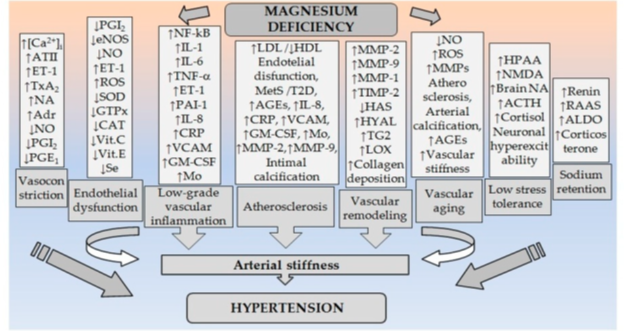There are so many reasons to pay close attention to magnesium, the fourth most abundant mineral in the human body. One of the most important ones is the vital role that it plays in cardiovascular health, from maintaining the integrity of blood vessels to keeping your heart beating.
If you want to reduce your risk of cardiovascular disease, and keep your heart, mind, and body healthy, keep magnesium in mind.

Source: Kostov, Krasimir, and Lyudmila Halacheva. “Role of Magnesium Deficiency in Promoting Atherosclerosis, Endothelial Dysfunction, and Arterial Stiffening as Risk Factors for Hypertension.” International journal of molecular sciences vol. 19,6 1724. 11 Jun. 2018, doi:10.3390/ijms19061724 [R] This article is an open access article distributed under the terms and conditions of the Creative Commons Attribution (CC BY) license.
|
General |
Anxiety, agitation, irritability, headache, loss of appetite, nausea |
|
Musculature |
muscle spasm and tetany |
|
Central Nervous System, nerves |
Nervousness, migraine, depression, poor memory, low-stress tolerance, paraesthesia, tremor, seizures, neuropsychiatric disorders |
|
Cardiovascular system |
High blood pressure Risk of arrhythmias, coronary spasm, atherosclerosis, endothelial dysfunction, vascular inflammation, arterial stiffness, vascular ECM remodeling, arterial calcification, vascular aging, increased platelet aggregation, potentiates vasoconstriction |
|
Electrolytes |
Sodium retention, hypokalemia, and hypocalcemia |
|
Metabolism |
Dyslipoproteinemia, insulin resistance, pancreatic beta-cell dysfunction, decreased glucose tolerance, increased risk of metabolic syndrome and type 2 diabetes, disorders of vitamin D metabolism, resistance to PTH, osteoporosis |
|
Pregnancy |
Pregnancy complications (e.g., eclampsia) |
|
Gastrointestinal tract |
Constipation |
Fortunately, there is an easy, convenient way to avoid magnesium deficiency… consume, absorb, and retain enough magnesium to meet your needs. Adults need to consume approximately 6 mg per kg of body weight. So, for someone that weighs 150 pounds or 68 kg, they would need at least 408 mg of magnesium per day. Any losses from sweat or from the GI system must be replaced.
Unfortunately, up to 82% of adults don’t consume enough magnesium, especially as we get older. Much of this deficit comes from excess intake of highly processed foods and a Western-style diet. Processing and boiling alone can remove up to 85% of magnesium from food.
The best sources of magnesium include dark leafy green vegetables, whole grains, nuts, and legumes. Fruits, chocolate, meats. and fish are good sources as well, while dairy products are poor sources. Drinking water may or may not be a source of magnesium, depending on its processing. Researchers suggest that consumption of 10-100 mg/L of magnesium in drinking water may help improve the magnesium status of communities, especially those with low intake.
Magnesium supplements are best absorbed when bound to compounds such as aspartate, gluconate, and citrate for the highest bioavailability.
Blood levels of magnesium shouldn’t drop below 2 mg/dL (0.85 mmol/L). Too much isn’t good either. Blood levels greater than 19.5 mg/dL (8 mmol/L) can be toxic and cause hypotension, vasodilation, drowsiness, and cardiac complications.
Magnesium is one of those things that you just can’t live without… so don’t!
Kostov, Krasimir, and Lyudmila Halacheva. “Role of Magnesium Deficiency in Promoting Atherosclerosis, Endothelial Dysfunction, and Arterial Stiffening as Risk Factors for Hypertension.” International journal of molecular sciences vol. 19,6 1724. 11 Jun. 2018, doi:10.3390/ijms19061724
This article is an open access article distributed under the terms and conditions of the Creative Commons Attribution (CC BY) license.